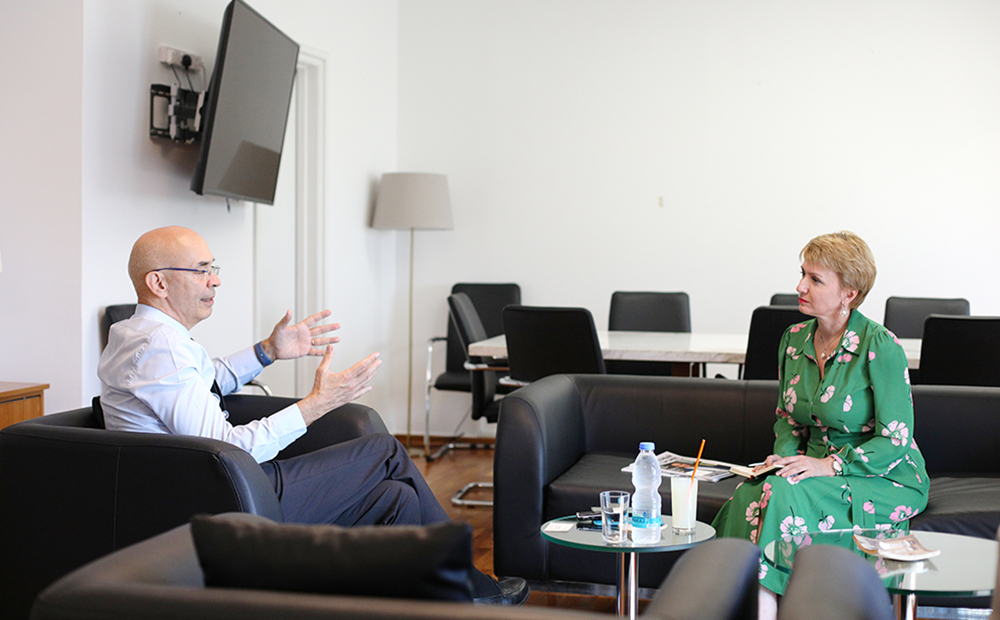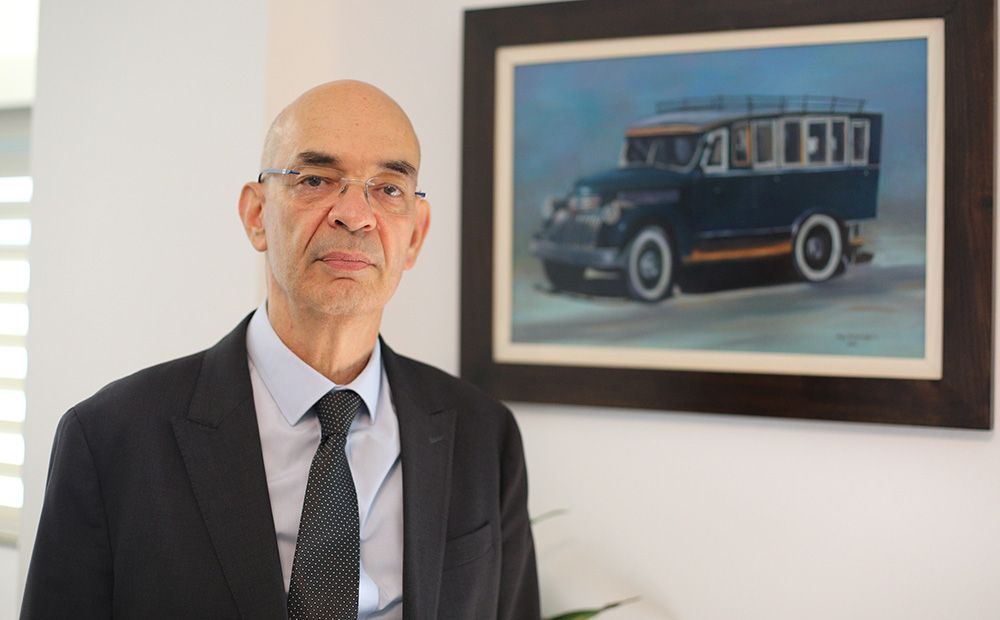In this interview, Alexis Vafeades, a key figure in shaping Cyprus’ future, delves into the pressing challenges and ambitious plans for the nation’s transport and infrastructure. With a vision that extends beyond the congested streets of Limassol and Nicosia, Vafeades unveils a strategic blueprint aimed at transforming Cyprus into a dynamic hub of efficiency and sustainability. From pioneering public-private partnerships to revolutionizing the country’s transport system, his insights offer a glimpse into the transformative journey Cyprus is embarking on.
You have an architectural background. As a professional, what did you think about Cyprus’ public transport or infrastructure in terms of design and efficiency? How has your vision changed since you became a minister and learned more about this area?
As an architect, I believed architecture isn’t just about buildings; it’s a way of thinking, an approach to creating an environment. It can be viewed at different scales – from a basic to a more global level. Previously, there were architects focusing solely on airports, for example. From the other hand, a significant architect of the last century, Le Corbusier, had grandiose ideas about developing Paris as a city. It all depends on the scope, interests, and how you approach a problem, applying architectural principles.
My professional experience allows me to reconsider the transport situation in the country. Transport should be viewed as a circulation process, moving people around. This happens at the level of a neighbourhood, a city, and a country. Therefore, it’s important to understand the impact of this process on all participants and to have a vision of how a more efficient, passenger-oriented transport system will improve people’s lives.
Is public transport efficient in Cyprus?
I don’t think public transport will ever be efficient in such a small country. It needs to be a good alternative to private cars. It can be cheaper and faster, especially in heavy traffic conditions. Buses should travel faster than cars in city centers to have a competitive advantage.
Currently, buses often run half-empty, creating many unnecessary emissions. Do you plan to change the situation?
Buses do create emissions, but on the other hand, they can replace 30-50 cars on that route. The problem of empty buses exists in every country. We are trying to find ways to solve it, for example, running pilot projects where elderly people from villages can book a bus seat in advance at a certain time of day to go to the doctor, visit friends, or take a stroll in the city centre. This allows people to access buses simply by calling. This is particularly important in remote areas, where the bus service operates as part of social services, and there are also many empty trips.
If nobody calls and reserves, can the bus not go on its route?
Yes, the bus won’t go.
What can you say about the construction industry? You’ve been working in this field since 1988. What do you think is its current state?
The Ministry of Transport is responsible for buildings used by the state, not urban planning. We approach changes in the construction industry with green transformation in mind, which means huge changes as it alters many factors that need to be considered when designing a building. Previously, we had “people, budget, workspaces needed by people”, and we worked with these factors. Now, we need to add another level – the “energy budget”. You’ll see that in the coming years, this will radically change the construction industry.
It will change the design, layouts, external appearance of buildings, insulation quality, ventilation possibilities, and the quality of materials used. Soon, we will see entirely new buildings with a new approach to design. We probably won’t be able to meet in an office like mine now, a 60 m2 office.
What will change in government offices?
To meet ecological transition goals, we need to minimize energy consumption and maximize energy production. We understand that ventilating and air-conditioning an office requires a certain amount of energy. Obviously, for a 60 m2 office, more is needed than for a 40 m2 office. We will see efforts directed towards finding ways to reduce spaces, which will allow us to decrease energy consumption and meet the energy budget. Ultimately, this will help us achieve ecological transition goals.
Another important point we will soon see is a meticulous effort in the field of reconstruction. We will be changing existing buildings.
Do you plan major renovations?
Yes. In many spaces only part of the area is used, and the rest is vacant. But there could be more people accommodated there. We need to reconsider everything and free up spaces so that more people can work efficiently in that space. This saves money, not just in terms of energy, but also in terms of building new buildings.
What about the roads?
Roads are a broad concept, comprising several parts. One part is roads that provide connectivity and stability for remote communities. We need to improve the road network so that people living outside city centres have good access to everything necessary.
In city centres, the population density is higher, so more resources are available, meaning better schools and hospitals. In more remote areas, fewer people live, and they don’t have as good medical care and education. That’s the reality of the economy.
We need to create our network, allowing residents of the outskirts to have quick and easy access to high-quality medical services and education. This is important for both the older generation, who need good medical care, and young families who want to monitor their health to be productive and provide good education for their children.
In some countries, there’s a trend of moving government organisations, schools, and hospitals out of city centres to reduce road congestion. But in my opinion, this is not yet working in Cyprus.
I think this is what we will see in the future. We must understand that the city centre is overloaded because many people want to get to the same area at the same time. If we move some services to the outskirts, we can create movement in the opposite direction, from the centre. I think this makes sense. It will also reduce the ecological load on the city centre from car emissions.
At the same time, it’s important to maintain a balance so that centres don’t become lifeless, empty. Let’s look at office workers. They come to work in the morning and leave in the evening, not participating in the daily life of the city. Essentially, it doesn’t matter where the office building is located – in the centre or on the outskirts.
Office workers come in cars and park them all around.
Exactly. Firstly, this creates traffic jams. Secondly, the Government builds underground parking lots for cars. That’s another load on the taxpayer.
Thus, we have several strong arguments to move part of the people, such as officials who don’t participate in the daily life of city centres, to the suburbs. We’ll create movement outward, not inward.
There will be those who criticise this decision, saying, “Before, the ministries were concentrated in one area, and now you need to move around the city to communicate. Now you’re creating ‘extra’ movement.”
This movement exists now since government bodies are located in different buildings and places. In my opinion, most government services should be located in one office park, which will make it easier for visitors, reduce the load on the city centre, and create savings on building and parking management.
Moreover, this will provide more effective communication between services.
You have experience working at Demetra Investments, so you can evaluate many business opportunities. How do you see public-private partnerships, and do they have a future? What specifically can be done in this regard?
The government definitely relies on private initiative. The private sector is very efficient and can do more with fewer resources and in a shorter time. Private sector businesses can complete projects faster than the public sector. Therefore, the government’s role, in my opinion, is not only to improve legislation but also to create opportunities for the development of the private industry for the benefit of people.
Caring for every citizen is always at the top of the government’s agenda. And we need to find ways to provide as many services as possible to as many citizens as possible. This is best done in partnership between the public and private sector.
Please give examples of what and how will affect the daily lives of citizens.
I’ll tell you about one example where you can already see the benefits today. It’s the example of the airports. The project costs over 600 million euros. It is implemented by the State in partnership with Hermes Airports, which operates the airport. We can already talk about the effectiveness of this project and dividends from it.
Such cooperation has also proved successful with sea vessels. Of course, any such project can have problems, but there is always goodwill to solve them.

Photo: Danil Shamkin / sb-cyprus.com
In which other sectors is this possible to implement?
We recognize the importance and consider opportunities for cooperation with the private sector also in logistics and energy.
What’s the biggest challenge for you as Minister of Transport, Communication and Works?
As a Minister, I have many challenges. But the number one priority today is congestion. At the same time, we will not achieve any improvements if we do not address the “green transition”. Not only traffic, but also the entire country will suffer. We hope that, by making the “green transition”, we will be able to clear our streets among other things.
This is especially important for Limassol and Nicosia. In Nicosia, it is impossible to move around the city in the morning.
Limassol is also facing difficulties in this regard. The city is experiencing growing economic activity. This is great and joyful. But economic activity comes with certain challenges. For example, if a new company opens with 300 employees, it means an addition of 1.200 car movements per day. And we are not talking about one company, but many.
What could be the solution for Limassol? In Nicosia – it’s the bypass road. But in Limassol, this can’t be done because of the mountains.
Yes, Limassol is different from Nicosia. In Nicosia, there is a city centre and several major highways leading into the city. In Limassol, there is one big road and traffic jams around it. We aim to implement similar solutions adapted to the local conditions.
Especially at roundabouts.
Yes, especially at roundabouts.
Do we need to build flyovers or something similar?
I don’t think building more roads will help solve the issue. More roads create more traffic. Of course improving connectivity can be achieved by completing the road network which is our aim.
Restrictions will also create more traffic.
You’re right, but we’re not thinking about introducing restrictions. We’re looking for an opportunity to provide people with alternative solutions, like buses, for example.
For me, the primary goal in this project is the northern side of the city, where many people come down from mountainous areas. We need to find a better way for them to descend than their personal cars.
But the problem with Limassol is that there are even fewer bus lanes in the city than in Nicosia. Without these lanes, not much can be done effectively, because in this case, the bus will not have a competitive advantage. If there is no advantage in speed, no one will switch from a car to a bus. Even if we give free bus tickets, but do not eliminate traffic jams, people will not want to travel like that. This is the main problem in Limassol.
I spoke with my Maltese colleague to find out how they are solving the same problem. They tried to remove one lane on the road and allocate it for buses. There were many discussions because most people were against it.
This is exactly what is happening in Limassol – the Municipality is trying to create one lane on the coastal road, and people are against it because the road along the sea is the only way to move around Limassol during peak hours.
That’s why the road network in Limassol is a huge challenge.
We can try to reduce new traffic now. For example, three educational institutions are being built on the Troodos road in addition to existing schools. I am in favor of transporting children by buses. Imagine, extra 1.500 students in schools, and every morning their parents will bring them in personal cars, and in the afternoon, they take them home. And all this at the same time.
If children travel by buses to and from school, the number of cars on the street will be much less. We can try to reduce road congestion with new roads, and then gradually introduce measures to reduce the number of cars on the roads.
We have a pilot project in the Ipsonas area, a suburb of Limassol, where bus routes pass by schools. We plan to implement the same in greater Limassol. I very much hope that this project will work.
Of course, primary school children will still be brought by parents, but for teenagers who want to be more independent, this could be a great opportunity to travel to school on their own. Even if we remove 50% of “school” traffic, it will already be a significant result.
When we implement this project, we can start thinking about other issues. Everything gradually. We won’t find one option that solves all the problems. We will do one thing, then a second, then a third...
If we worked from home at least once a week, it would also help a lot to relieve the roads. If children studied at school all day, it would also give a good result. I know that the Minister of Education is a supporter of such a solution. I think that soon there will be more full-day schools, and this will reduce the number of car trips when parents take their children to private lessons.
You see, the issue concerns not only the Ministry of Transport, Communication and Works but also other Ministries.
Is this issue of paramount importance to you today?
Yes. This is the most important.
What else can be mentioned among your priorities?
Another issue is related to buildings, namely their emissions into the atmosphere. We have a goal – zero carbon emissions – and we need to find ways to achieve it.
In addition, we have many other issues that require urgent solutions. For example, optimizing the operation of ports. This is a huge challenge for Cyprus, as we are on the edge of Europe. This, on the one hand, gives us an advantage, but on the other, brings inconveniences.
We are located between two groups of countries with high economic activity. On one side is Europe, on the other are Saudi Arabia, the United Arab Emirates and Qatar.
Economic activity there is much higher than in today’s Europe.
Yes, exactly. In addition, there is India, which has a huge trade influence in the World. Essentially, we are at the intersection of these zones of activity.
If we reduced taxes and fees in ports and airports, could we become a place for transit on some long air routes?
I don’t think so. There are already hubs that are much larger than we can afford. For example, there is a huge airport in Istanbul/Constantinople.
Larnaca won’t be able to compete?
Unfortunately, no. Larnaca, compared to the airports of Vienna or Frankfurt, is very small. It makes no sense for us to even try to compete with them.
What should we strive for?
I think we should focus on becoming a distribution center. We can offer additional value as transhipment port.
Will the government help the ports or airports to lower prices, as with the high fees like now Cyprus is not competitive?
I know we are not competitive. By creating partnerships in airports and ports, we aimed at our goal. We got maximum value, but at the same time, there was a downside – high cost. We won in the value of the port, but missed the opportunity to improve trade.
Now there may be competition between the ports of Larnaca and Limassol. There will be two different owners, there will be creative competition, which we do not have in airports, as both contracts were given to one company.
In airports, there is no competition, as we have the same operator. As for ports, Larnaca was originally intended for cruise ships, and Limassol – for commerce. However, it is most important to find opportunities to become competitive (in terms of ports) throughout the Eastern Mediterranean. And this is a challenge.
What would you like to be proud of in five years, leaving the post of Minister? What contribution do you aim to make to the country’s development?
I don’t think about my work from this point of view. I know that all the projects currently being completed are the work of two or three Ministers before me. Everything we do in the Ministry is long-term projects. These are things that come to life in 6-10 years. I won’t be in office that long. But I would really like to lay the foundations for good projects that could come to life in the near future.
My main goal is to identify and launch projects that will add value to the residents of Cyprus. If I can do this, and then watch them be implemented, I will be happy.
Alexis Vafeades studied architecture at the University of South California (USC).
He practiced as an architect since 1988 and was a partner and a shareholder in the family business. He is a member of the Cyprus Scientific and Technical Chamber (ETEK).
Alexis Vafeades was a member of the BoD of Demetra Holdings Plc and of the Cyprus Joint Construction Contracts Tribunal (CyJCCT). During his last term as president of CyJCCT, he contributed to the update of the current construction contracts and to the addition of new texts, to help meet the new demands of the construction industry.
He was also a BoD member of the Council for the Registration of Building and Civil Engineering Contractors and of the Cyprus Architects Association.
Alexis Vafeades is married to Evangelia and has two children, Maria and Kostas.







